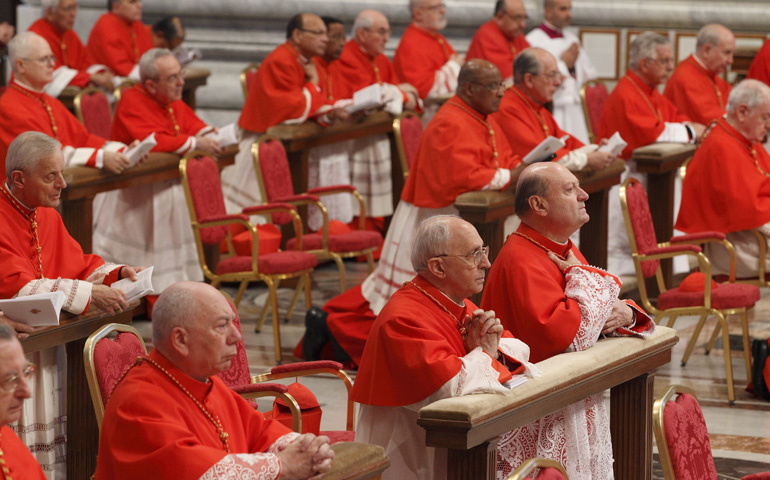
Cardinals pray during a 2012 Mass for new cardinals celebrated by Pope Benedict XVI in St. Peter's Basilica at the Vatican. (CNS/Paul Haring)
For only the second time so far in his papacy, Pope Francis will name new cardinals of the Catholic church, giving him an opportunity to concretize his influence over who will be chosen as his successor one day.
Francis will name the new cardinals at a Feb. 14-15 ceremony, formally known as a consistory, Vatican spokesman Jesuit Fr. Federico Lombardi said at a briefing Thursday.
Cardinals, sometimes known as the "princes of the church" and for their wearing of red vestments, are usually senior Catholic prelates who serve either as archbishops in the world's largest dioceses or in the Vatican's central bureaucracy.
After a pope's death or renunciation of the papal office, cardinals are also responsible for governing the church until they meet together in a secret conclave to elect the next pope.
The Vatican spokesman said the pope did not say which prelates would be named cardinals, but the names are expected to be made public in mid-January.
The ceremony creating new cardinals will be one of several meetings that will make for an unusually busy February at the Vatican.
The first will be a Feb. 6-8 plenary session of the new papal commission on sexual abuse of minors, then a Feb. 9-11 meeting of the Council of Cardinals. All of the cardinals will meet Feb. 12-13 before the formal naming of the select group's new additions.
Lombardi announced the dates during a press briefing Thursday on the latest meeting of the Council of Cardinals, a group of nine cardinals advising the pope on reforming the Vatican bureaucracy, known commonly as the Roman Curia.
The Council of Cardinals, which includes prelates from six of the world's continents, met Tuesday through Thursday at the Vatican. It is the seventh meeting of the group, which Francis first assembled last year.
During his briefing Thursday, Lombardi gave only general topics and themes discussed by the cardinals during this week's meeting.
One issue Lombardi said the cardinals spoke about in particular was the functioning of the papal sexual abuse commission, which was created in December 2013 at the group's advice.
The commission, which is tasked with advising the pope on safeguarding children from sex abuse and working pastorally with abuse victims, is led by Boston Cardinal Sean O'Malley, who is also a member of the Council of Cardinals.
Lombardi said the cardinals discussed adding an additional nine members to the commission, bringing the total number of people working on it to 18, although the spokesmen said that was "not a definite number."
Lombardi also said the cardinals hope to add members to the commission from various parts of the world, "from diverse situations, cultural and ecclesial." The February plenary session of the commission, the spokesman said, will involve all its members and hopefully will allow them to program and develop their scheme of work.
February's consistory making new cardinals will give Francis the opportunity to select at least 10 more prelates who at this point would be able to vote for his successor.
Cardinals are able to vote in conclaves until they reach the age of 80.
There are currently 208 cardinals of the church, following the Dec. 8 death of Argentine Cardinal Jorge Maria Mejia. Currently, 112 cardinals are under the age of 80, with two more -- Indonesian Julius Darmaatmadja and Italian Giovanni Lajolo -- turning 80 before the February consistory.
Pope Paul VI in 1973 limited the number of cardinals allowed to be appointed under the age of 80 to 120, although Pope John Paul II consistently broke that rule.
In his first consistory creating new cardinals, held Feb. 22, Francis picked 19 prelates for the honor who mainly hail from the "global south," including Haiti, Burkina Faso, and the Philippines.
In that consistory, Francis also chose three archbishops over the age of 80 to receive the honor, including Loris Capovilla, who served as the personal secretary of the late Pope John XXIII.
In terms of the continuing reform of the Vatican bureaucracy, Francis said in an interview with the Argentine daily La Nacion on Sunday that such reform would not be ready by 2015.
"It's a slow process," he said. "You know, reforming the Curia will take a long time, this is the most complex part ... we're tackling it little by little."
Honduran Cardinal Oscar Maradiaga Rodriguez, who serves as the coordinator of the Council of Cardinals, said in an interview earlier in December that two new Vatican congregations were "certain" to result from the council's deliberations -- congregations dedicated to the laity and to charity.
The aim of the reform, Maradiaga told Vatican Insider, "is to rationalize and simplify things."
[Joshua J. McElwee is NCR Vatican correspondent. His email address is jmcelwee@ncronline.org. Follow him on Twitter: @joshjmac.]

